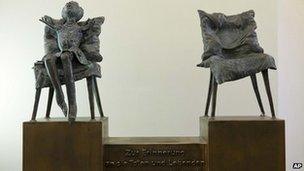German thalidomide maker Gruenenthal issues apology
- Published
- comments

The bronze statue of a child born with thalidomide symptoms is on display in Stolberg, Germany
The German company that invented thalidomide has issued its first apology in 50 years to thousands of people born with disabilities after their mothers took the drug.
The drug, sold in the 1950s as a cure for morning sickness, was linked to birth defects and withdrawn in 1961.
Gruenenthal said it was "very sorry" it had remained silent on the issue.
But his apology has been dismissed as insufficient by victims' groups who say the firm should pay compensation.
'Physical hardship'
Mr Stock, Gruenenthal's chief executive, issued his company's apology at the unveiling of a bronze statue symbolising a child born without limbs because of thalidomide.
"We ask for forgiveness that for nearly 50 years we didn't find a way of reaching out to you from human being to human being," he said at a ceremony in the western German city of Stolberg, where the firm is based.
"We ask that you regard our long silence as a sign of the shock that your fate caused in us.
"We wish that the thalidomide tragedy had never happened. We see both the physical hardship and the emotional stress that the affected, their families and particularly their mothers, had to suffer because of thalidomide and still have to endure day by day."
'Financial compensation'
By the time the drug was pulled from the market, more than 10,000 babies worldwide had been born with a range of disabilities caused by the drug.
This included shortened arms and legs, blindness, deafness, heart problems and brain damage.
There are between 5,000 and 6,000 sufferers still alive. Thalidomide UK says there are 458 people in the UK who were affected by the drug, but that for every thalidomide baby that lived there were 10 that died.
Mr Stock said the company regretted that the potential for thalidomide to affect the development of foetuses "could not be detected by the tests that we and others carried out before it was marketed".
BBC science correspondent for the Today programme, Tom Feilden, said one of the main issues was what Gruenenthal knew about the drug's side effects, when it knew about them and whether the company could have acted sooner in withdrawing it from the market.
Martin Johnson, director of the Thalidomide Trust, told the BBC that the news that the manufacturers were starting to acknowledge responsibility was welcome but they were still trying to perpetuate the myth that no-one could have known of the harm the drug could cause when there was, he said, much evidence that they did know.
Freddie Astbury, the president of Thalidomide UK, said: "It's taken a long time for them to apologise. There are a lot of people damaged by thalidomide struggling with health problems in the UK and around the world.
"So we welcome the apology, but how far do they want to go? It's no good apologising if they won't open discussions on compensation. They've got to seriously consider financial compensation for these people.
"We just want people to live a comfortable life and that means Gruenenthal have to pay for their mistake financially."
Some compensation has been paid, particularly by thalidomide's British distributor.
Gruenenthal itself has previously paid compensation to victims of the drug, many in Germany, and has voiced regret over the issue - but has not admitted liability.
Compensation claims are still outstanding, including one key class action in Australia, which saw thalidomide victims win the right to have their case for compensation heard there.
The drug is still used today under strict controls to treat some bone marrow cancer patients.
- Published3 November 2011
- Published20 June 2012